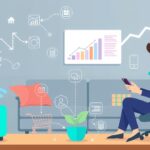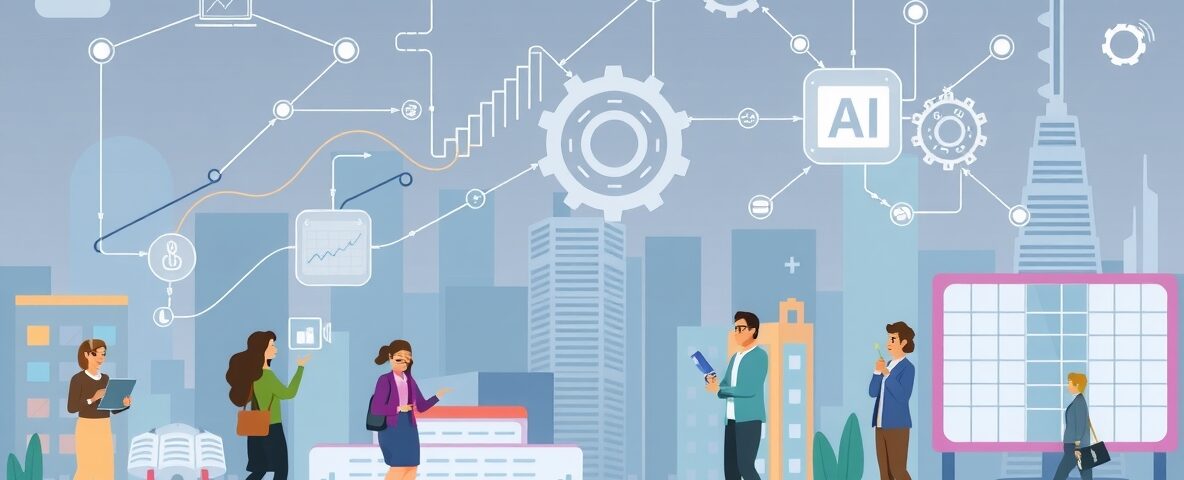
The Power of Voice Search: Transforming AI Marketing for the Future
September 19, 2025
From Queries to Conversions: How Chatbots Enhance Customer Engagement
September 19, 2025In the fast-paced world of technology, two transformative forces have emerged as major game-changers: the Internet of Things (IoT) and Artificial Intelligence (AI). These two innovative fields are now coming together, creating a synergy that holds the potential to reshape our world. In this blog post, we will explore the intersection of IoT and AI, understanding how they work together and the profound impact they are having on various industries.
IoT and AI are two separate tools but at the same time, they are both very powerful. IoT helps you in connecting your devices wirelessly. It will help them perform different tasks without human intervention. When you combine these two tools, it will help in analyzing human behavior.
Bridging the Gap Between IoT and AI: A Symbiotic Relationship.jpg)
In the ever-evolving world of technology, two groundbreaking fields have emerged as game-changers: the Internet of Things (IoT) and Artificial Intelligence (AI). These two technological giants are now joining forces, creating a synergy that promises to reshape our world. In this blog post, we’ll delve deep into the fascinating realm where IoT and AI intersect, exploring their interconnectedness and the transformative potential they hold.
Unpacking the Internet of Things (IoT)
Before we dive headfirst into the marriage of IoT and AI, let’s first understand the fundamental concepts behind IoT. In simple terms, IoT refers to a network of interconnected physical devices, vehicles, buildings, and even everyday objects embedded with sensors, software, and connectivity. These devices can collect and exchange data, creating a web of information that powers smart applications and services.
The Pervasive Presence of IoT Devices
IoT devices have infiltrated various aspects of our lives, from smart thermostats optimizing energy consumption to wearable fitness trackers monitoring our health. The ubiquity of these devices lays the foundation for their integration with AI, setting the stage for revolutionary developments.
Unveiling the Power of Artificial Intelligence (AI)
On the other side of the spectrum, we have AI, a field of computer science that focuses on creating intelligent machines capable of performing tasks that typically require human intelligence. AI encompasses various technologies, including machine learning, natural language processing, and computer vision.
The AI Renaissance
AI has witnessed a renaissance in recent years, thanks to advancements in machine learning algorithms and increased computational power. This resurgence has enabled AI to excel in diverse domains, from healthcare and finance to autonomous vehicles and customer service chatbots.
The Intersection of IoT and AI: A Technological Convergence
As IoT devices continue to proliferate, they generate an astonishing volume of data. This data, often referred to as “Big Data,” serves as the lifeblood of AI algorithms. Here’s where the magic happens – AI leverages this data to gain insights, make predictions, and facilitate autonomous decision-making. Let’s explore the fascinating ways in which IoT and AI are converging:
Enhancing Predictive Maintenance
One of the most significant applications of IoT and AI synergy is predictive maintenance. Imagine a scenario where sensors in industrial machinery constantly monitor performance metrics. AI algorithms analyze this data in real-time, predicting when maintenance is needed, thus preventing costly breakdowns.
Revolutionizing Healthcare with Remote Monitoring
IoT-enabled medical devices are becoming increasingly prevalent. These devices collect patient data, which AI analyzes to detect anomalies and provide early warnings to healthcare providers. This enables remote monitoring and timely interventions, improving patient outcomes.
Smart Homes and Personalized Experiences
In the realm of smart homes, IoT devices, coupled with AI, create a seamless living experience. AI-powered virtual assistants like Amazon’s Alexa or Google Assistant use data from IoT devices to understand user preferences and provide personalized recommendations.
The Challenges and Considerations
While the amalgamation of IoT and AI offers tremendous potential, it’s not without its challenges and considerations. Here are some key factors to ponder:
Data Privacy and Security
The vast amount of data generated by IoT devices raises concerns about privacy and security. Protecting sensitive information from cyber threats is paramount, requiring robust encryption and authentication measures.
Scalability and Interoperability
As IoT ecosystems expand, ensuring the interoperability of devices from different manufacturers becomes crucial. Standards and protocols must be established to facilitate seamless communication between devices. Ethical Implications
AI’s ability to make autonomous decisions based on IoT data raises ethical questions. Who is responsible when an AI-driven vehicle makes a critical decision, or when an AI-powered medical device recommends treatment? Addressing these ethical dilemmas is essential.
The Future of IoT and AI: Endless Possibilities
The synergy between IoT and AI is still in its infancy, but its potential is boundless. As technology continues to advance, we can anticipate several exciting developments:
Enhanced Smart Cities
IoT sensors integrated with AI will transform cities into efficient, sustainable hubs. Traffic management, waste disposal, and energy consumption will be optimized to improve the quality of urban life.
Precision Agriculture
Agriculture will witness a revolution, with IoT sensors monitoring soil conditions, weather, and crop health. AI will enable precise decision-making in planting, irrigation, and pest control, leading to increased crop yields and reduced environmental impact.
Healthcare Breakthroughs
AI-driven diagnostics and treatment recommendations will become commonplace, enabling healthcare professionals to provide more accurate and personalized care. Wearable IoT devices will continue to play a significant role in preventive healthcare.
Conclusion
In this blog post, we’ve embarked on a journey through the enthralling intersection of IoT and AI. We’ve explored how IoT devices provide the data fuel that AI algorithms need to function effectively, examined real-world applications, and pondered the challenges and ethical considerations that come with this technological convergence. The future is promising, as IoT and AI continue to evolve, shaping a world of endless possibilities.
FAQs (Frequently Asked Questions)
Q1: What is the primary advantage of combining IoT and AI?
A: The primary advantage of combining IoT and AI is the ability to leverage the vast amounts of data generated by IoT devices to make informed decisions, predictions, and automate processes in various domains, from predictive maintenance to healthcare.
Q2: What are the key challenges in integrating IoT and AI?
A: Some key challenges in integrating IoT and AI include data privacy and security concerns, ensuring scalability and interoperability of IoT devices, and addressing ethical implications related to autonomous decision-making by AI systems.
Q3: How does IoT enhance the security of smart cities?
A: IoT enables smart cities to have real-time surveillance and monitoring, making it easier to detect and respond to security threats promptly. AI-powered analytics can help identify unusual patterns and potential security breaches.
Q4: Can AI in healthcare replace human doctors?
A: AI in healthcare is a powerful tool for diagnosis and treatment recommendations, but it’s unlikely to replace human doctors entirely. Instead, it complements healthcare professionals, providing them with valuable insights and support.
Q5: Are there any privacy concerns with IoT and AI in agriculture?
A: Yes, privacy concerns exist in agriculture, particularly regarding data collected from farmers’ fields. It’s crucial to establish clear data ownership and usage policies to address these concerns responsibly.
In conclusion, the fusion of IoT and AI is a technological marvel that promises to reshape our world. From smart cities to healthcare, agriculture to manufacturing, these technologies are unlocking unprecedented possibilities and transforming industries. However, as we journey into this future, it’s crucial to address challenges related to privacy, security, and ethics to ensure that the power of IoT and AI is harnessed for the greater good of society.


